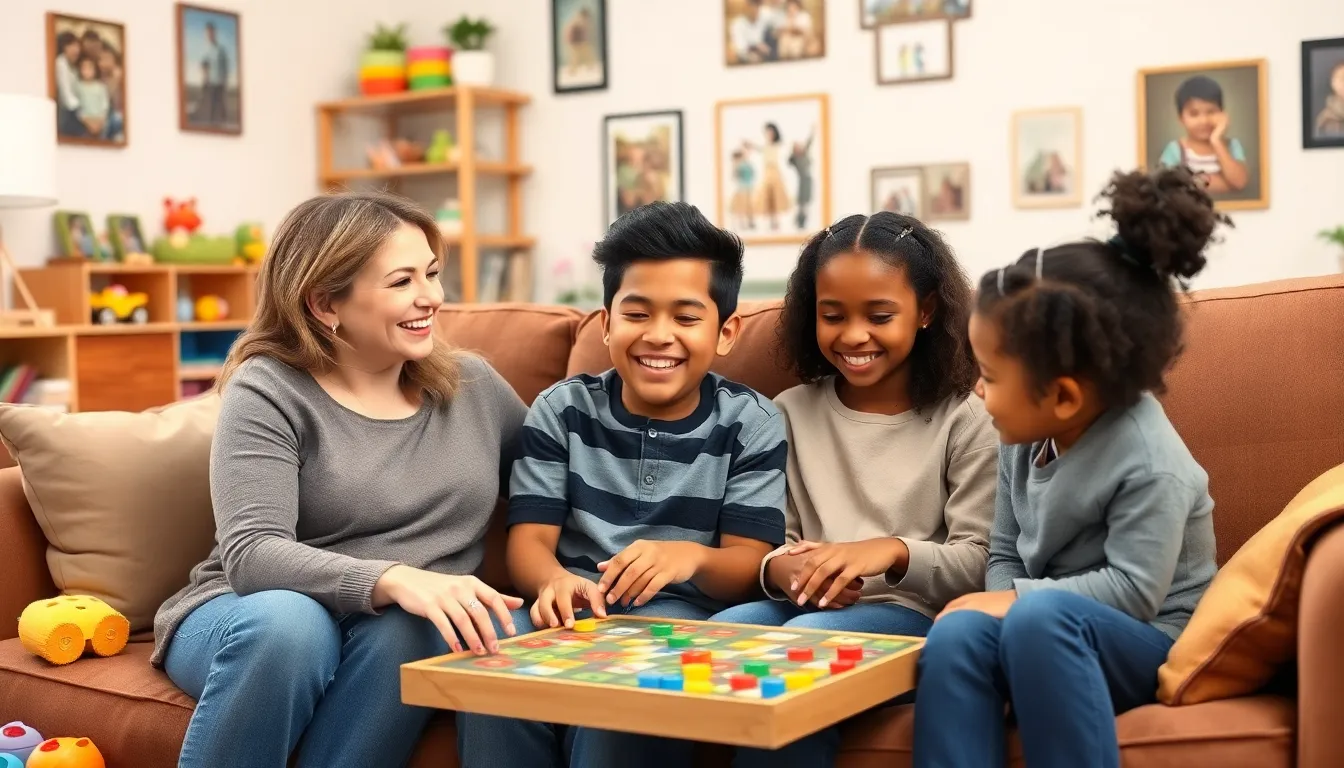Table of Contents
ToggleNavigating the world of a divorced family can feel like stepping into a sitcom—complete with awkward family dinners and unexpected plot twists. It’s a unique landscape where co-parenting strategies and holiday schedules become the new normal. While it may seem daunting, embracing this new chapter can lead to unexpected joys and deeper connections.
In a divorced family, laughter often becomes the best coping mechanism. From shared parenting hacks to the art of juggling multiple family dynamics, there’s a wealth of wisdom hidden in the chaos. This article dives into the realities of divorced families, offering insights and tips to turn challenges into opportunities for growth and understanding. After all, who said divorce can’t come with a side of humor?
Understanding Divorced Families
Divorced families experience unique challenges and opportunities. Navigating these dynamics often requires flexibility and understanding.
The Dynamics of Divorce
Divorce alters family interactions significantly. Communication patterns frequently change, impacting relationships. Children may feel divided between parents, leading to emotional stress. Parents face the challenge of co-parenting effectively while managing their own emotions. Each individual must adapt to new roles and responsibilities in daily life, which can create conflict or unity. Shared activities, such as school events, require careful planning to maintain a cooperative spirit. Finding common ground becomes essential for fostering a positive environment.
Impact on Family Structure
Divorce reshapes family structures in various ways. Traditional notions of family often expand to include stepfamilies, blending different dynamics. Children may have to adjust to living with stepparents or stepsiblings, creating potential for both bonding and tension. Custody arrangements dictate living situations, sometimes impacting children’s stability. Holidays and traditions often undergo significant changes, requiring families to create new ways to celebrate. Adjusting to these shifts helps establish a new normal while preserving valuable relationships. Building connections among all family members is critical for long-term harmony.
Coping Strategies for Children


Divorce introduces challenges for children, necessitating coping strategies that foster resilience and emotional well-being. Implementing these strategies enhances children’s ability to navigate their new family dynamics.
Emotional Support
Emotional support plays a vital role in helping children process their feelings. Parents can offer a listening ear, validating their child’s emotions without judgment. Seeking professional help, such as a therapist or counselor, often provides an additional layer of support. Encouraging open conversations about feelings creates a safe space for expression. Family members, including relatives, can also contribute by being available and understanding. Peer support is equally important; fostering friendships helps alleviate feelings of isolation. Ensuring children know they are not alone in their experiences promotes healing and growth.
Communication Techniques
Effective communication techniques significantly improve interactions within divorced families. Encouraging open dialogue, where children feel free to express concerns, fosters trust. Parents should model healthy communication, demonstrating active listening and empathy. Clear and consistent messages about family changes help minimize confusion. Setting regular check-ins allows for ongoing discussions about feelings and adjustments. Demonstrating patience during these conversations reinforces understanding. Using age-appropriate language ensures that children grasp concepts of divorce without added stress. These techniques facilitate more harmonious family dynamics, bridging emotional gaps and enhancing understanding.
Parenting in a Divorced Family
Navigating parenting in a divorced family requires intentional strategies and support for all involved. Prioritizing children’s needs can significantly impact their emotional well-being.
Co-Parenting Essentials
Effective co-parenting relies on clear communication between parents. Regular check-ins and family meetings foster transparency. Establishing consistent routines helps children feel secure in both homes. Use technology to stay connected, whether it’s through shared calendars or apps designed for co-parenting. Encourage mutual respect when discussing parenting decisions, avoiding negative remarks about the other parent. Flexibility in scheduling can promote smoother transitions, allowing adjustments when needed.
Creating a Stable Environment
A stable environment significantly influences a child’s adjustment after divorce. Designing each parent’s home to feel welcoming creates a sense of belonging. Implementing consistent rules and expectations across both households minimizes confusion. Visual reminders like photos and familiar items can provide comfort. Scheduling regular family activities strengthens bonds and creates a shared sense of identity. Listening actively to children’s concerns fosters trust, helping them express their feelings openly. Establishing new traditions can reinforce stability while acknowledging the changes in family dynamics.
Challenges Faced by Divorced Families
Divorced families navigate various challenges that can strain relationships and emotional well-being. Understanding these obstacles helps families adapt more effectively.
Financial Considerations
Financial stability often becomes a significant concern for divorced families. Parents face shifting financial responsibilities, which can lead to stress and conflict. Household budgets may require adjustment due to higher expenses related to child support or maintaining two homes. In fact, one study reveals that divorced households experience a 20 to 30 percent drop in household income on average. Planning for future expenses, like education and healthcare, becomes essential. Budgeting effectively and communicating openly about finances allows parents to provide a stable environment for their children and reduces potential conflict over money matters.
Navigating Relationships
Navigating relationships in a divorced family requires effort and understanding. Parents must build a cooperative partnership focused on their children’s well-being. Establishing respectful communication is essential, particularly when discussing parenting decisions. Children often feel pressure in divided loyalties, so prioritizing their emotional needs can mitigate this stress. Additionally, integrating new partners or step-siblings into family dynamics introduces new complexities. Each family member plays a role in fostering trust and connection. By practicing patience and empathy, divorced families can create a supportive atmosphere, making transitions smoother for everyone involved.
Resources for Divorced Families
Navigating the complexities of a divorced family requires support. Many resources can help families adjust and thrive in this new dynamic.
Support Groups
Support groups provide a platform for individuals to share experiences. Groups often allow parents and children to connect with others facing similar challenges. Local community resources and online forums offer varied options. Engaging in discussions helps relieve feelings of isolation. Many organizations, such as the Family Resources Network, facilitate connections through gatherings and events. Creating bonds with others fosters understanding and trust, enhancing emotional well-being within the family structure.
Professional Assistance
Professional assistance plays a crucial role in navigating divorce-related challenges. Counselors and therapists specialize in helping families adjust to new dynamics. Regular sessions can provide tools for effective communication and coping strategies. Parents benefit from learning how to support their children’s emotional needs. Child psychologists often offer tailored advice to enhance children’s resilience during transitions. Utilizing their expertise can significantly improve family interactions and emotional health. Ultimately, professional support not only addresses individual concerns but also strengthens family bonds.




